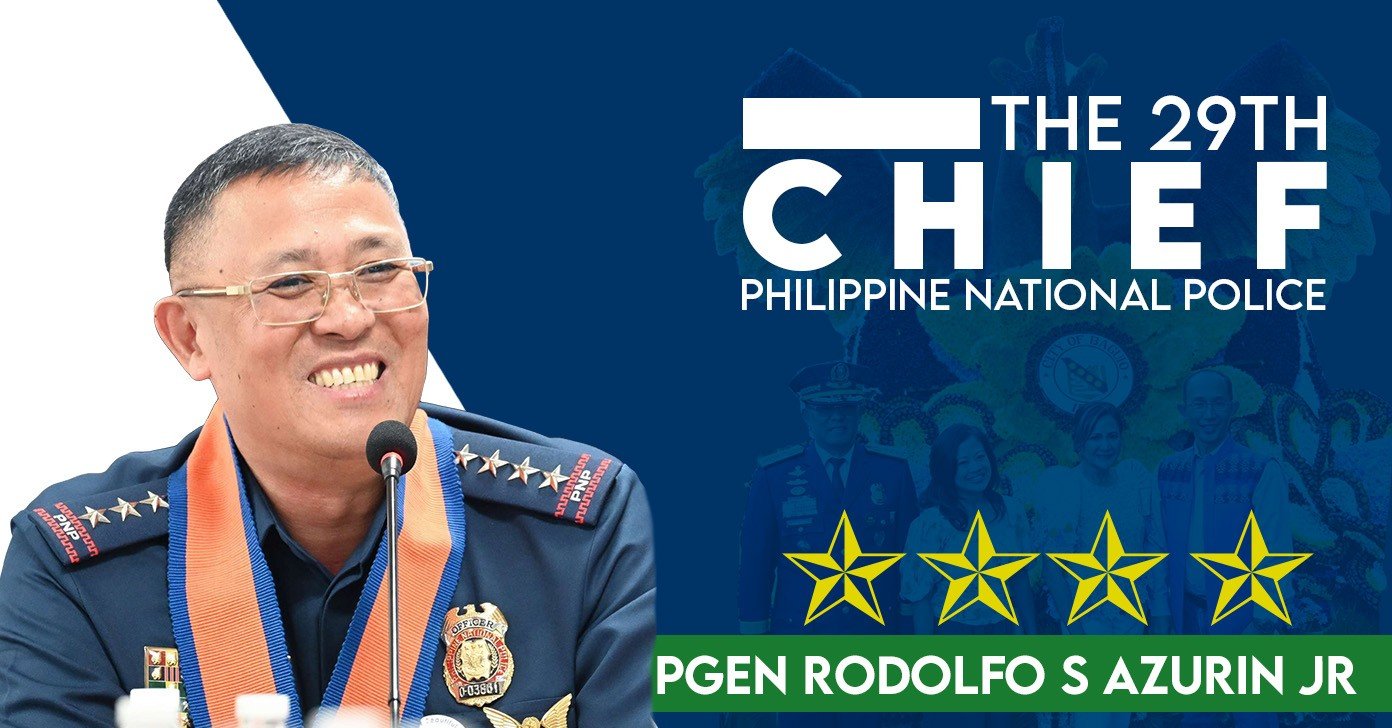Police General Rodolfo Santos Azurin, Jr is the 28th Chief of the Philippine National Police (CPNP), taking charge of the 250,000-strong police force on August 3, 2022. Born April 24, 1967, in Paniqui, Tarlac, he spent his formative years in La Trinidad, Benguet. He received his primary education at Benguet State University and later at Saint Louis Boys High in Baguio City. Azurin is married to Mary Grace Lino, and they have three children named Martin, Ninna, and Aaron. He graduated from the Philippine Military Academy, joining the “Makatao” Class of 1989, and holds a Master’s degree from the University of the Philippines, Baguio Campus.
In a study, Leyaley RVG (2016) concluded that Igorots follow INAYAN as a principle for achieving a peaceful and progressive life. Inayan encompasses values such as respect, love, and peace while forbidding harm to others. It promotes peaceful conflict resolution by relying on traditional practices and legal settlements. Putting forward this study will be discussed in the succeeding paragraphs in the form of policing concept application, which is significantly impacted by culture and values. In retrospect, the author of this paper contends that an individual’s upbringing of cultural and family values significantly shapes one’s decision-making and policy formation.
In the policing realm, PGen Azurin’s flagship program for the PNP is aligned with the “inayan” concept, employing the MKK=K (“Malasakit + Kaayusan + Kapayapaan = Kaunlaran”) framework. Translating COP=Progress (Compassion + Order + Peace leads to Progress) is the basis for his nationwide policing approach, which emphasizes transparent police operations incorporating the Filipino value of “MALASAKIT” to earn the people’s trust and support. This enables the establishment of a sustainable “KAAYUSAN” within the communities and ensures the safety of “everyJUAN,” who can walk the streets, and goes to school and work without fear. It shows that when peace and security are attained, “everyJUAN” will experience “KAPAYAPAAN,” which entails a life without conflict.
By embodying “malasakit” and working towards “kaayusan”, Filipinos’ desire for “kapayapaan” is attainable, along with progress and development for the country. This echoes President BBM’s ambition vision of “KAUNLARAN” – “At sa pangarap na maging mas masinang ang kinabukasan natin at ng ating mga anak, ang pangarap niyo ay pangarap ko!”
However, like Newton’s Third Law of Motion, every action has an equal and opposite reaction. PGen Azurin’s approach to policing has faced disapproval from certain groups, particularly from Senator Ronald “Bato” Dela Rosa, a former CPNP, who argues that the framework’s approach lacks the necessary forcefulness (kulang sa asim) to discourage criminals from committing atrocious offenses, as opposed to the policing model he implemented during his term. While police officers should be proactive, Senator Bato’s framing of his idea carries a deeper meaning. PGen Azurin’s approach is grounded in 21st Century Policing, where “trust” is critical for maintaining the relationship between law enforcement and the people they serve in a democratic society. Trust is crucial for community stability, the integrity of the justice system, and the safe and effective delivery of policing services. Extensive research and practical experience validate that individuals are more likely to follow the law when they perceive that those enforcing it have legitimate authority. The public only grants legitimacy to individuals who act procedurally justly, which is essential in building trust and legitimacy.
Another line of thought, as in leadership, is demonstrated that people and organizations are managed in various ways. To succeed in any organization, it is essential to know the different leadership styles and when to use them; in the two concepts and strategies mentioned above, only time will tell which police leadership style and concept has prevailed in their given time.
Clearly, the indigenous perspective of “inayan” has been conceptualized within a policing framework (MKK=K) and bolstered by President BBM’s policy direction, reflecting common democratic values. This approach has been tested in a practical situation affecting government policies. PNP Chief Azurin argued against killing criminals, stating that the police should investigate crimes, identify suspects, file complaints, and ensure jail time for criminals rather than resorting to violence. This policing framework reinforces the PNP’s valid mandate, which is to prevent and solve crimes, and motto, “to serve and protect”; a framework following the law or operating under the rule of law, all consistent with the 1987 Philippine Constitution and International Law.
Arguably, the success of the war on drugs hinges on the PNP Quad Concept operating in synergy. Integrating intelligence, operations, investigation, and community policing is crucial, resulting in a higher likelihood of success without resorting to violence or violating laws. When executed procedurally justly, high legitimacy rises in the community’s perception, trust, and support towards the police follow. This approach upholds moral and ideal standards while achieving operational objectives. In Azurin’s leadership and concept, the drug war’s new face is aggressive but bloodless, in line with the rule of law, employing search warrant operations and inter-agency operability as the norm.
On the other hand, like his predecessors, Azurin has intensified the fight against corrupt police officers to enhance the PNP’s organizational legitimacy. The PNP is committed to continuing its efforts to clean up its ranks to reinforce public trust. For police commanders who do not comply, the command responsibility policy is imposed and will be replaced by competent officers to instill discipline within the organization. Further, Azurin’s move caused 956 senior-ranking officers (colonels and generals) to file their courtesy resignation to the President of the Republic, seeking to purge the PNP’s ranks. A five-member committee has been assigned to evaluate high-ranking police officers who have submitted courtesy resignations to determine their possible involvement in the drug trade following due process. Critics have called attention to policy and organizational gaps, with Richard Heydarian lamenting that “there is clear recognition that things were not working under the previous administration concerning the rule of law, public safety, and addressing the drug issue.”
Police General Azurin’s policing approach is designed to align with the current trend, the new generation’s mindset, and the laws in place. In less than four weeks, the 28th CPNP will be hanging off his police uniform after three decades of service in the PNP organization. It is interesting to note that he has been a leader who values his men’s morale and welfare and prioritizes family concerns while always seeking to challenge the status quo within the PNP (factors hampering the transformation program) to promote a more progressive PNP organization in the fight against crime, drugs, and terrorism. Whether his initiatives align with 21st Century Policing standards and are effective on the ground objective of the PNP PATROL Plan 2030 remains to be seen, and only the passage of time will reveal. However, it is evident that Azurin’s approach is a CSOP strategy in action synergized by cultural values.
by: Byron Filog Allatog
__________________________________________
DISCLAIMER:
The views expressed in this article are those of the author. They do not necessarily reflect the position of the Philippine National Police, the Armed Forces of the Philippines, or the Philippine Government.
CSOP101 is a professional learning site for community policing advocates, practitioners, and supporters in changing the policing landscape. It is likewise an issue-based, related to or addressing nation-building. The views expressed within individual blog posts (police blog and academic) are those of the author and do not reflect any official position or that of the author’s employers. Any concerns regarding this blog post or resources should be directed in the first instance to byron.allatog012@gmail.com.

